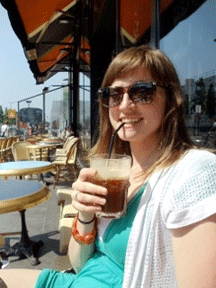
By Christine Noah
Jillian Rogers (ΦBK, University of Denver, 2006), a doctoral candidate at the University of California, Los Angeles, is the 2012 recipient of the Mary Isabel Sibley Fellowship in French Studies. She will be using the fellowship to travel to Paris to conduct research for her dissertation, “Grieving through Music in Interwar France: Maurice Ravel and his Circle, 1914-1934.”
Maurice Ravel (March 7, 1875–December 28, 1937), one of the most widely known French composers of the late nineteenth and early twentieth centuries, is best recognized for his use of melodies and textures. Daphnis et Chloé, his arrangement of Modest Mussorgsky’s Pictures at an Exhibition, and Boléro are among his most celebrated and remembered orchestral works.
The annual Sibley Fellowship is awarded alternately in the fields of Greek and French. The award may be used for the study of Greek language, literature, history, or archaeology, or the study of French language or literature.
The fellowship has a stipend of $20,000, and the award is not restricted to members of Phi Beta Kappa or to U.S. citizens. For more about the Sibley Fellowship and how to apply, click here.
INTERVIEW WITH JILLIAN ROGERS
Can you tell us a bit more about your dissertation?
ROGERS: In my dissertation, I explore how the music written by the French composer Maurice Ravel was used both by himself, as well as by a number of musicians, performers, writers, and patrons, as a way of dealing with grief and trauma during and after World War I. My dissertation is not only about the music that Ravel composed during this time period, but also about how this particular group of people—and especially Ravel himself—conceived of, experienced, and negotiated grief and its expression during this time period.
What got you interested in that specific time period and subject?
ROGERS: In the fall of 2009, I took a seminar entitled “Uncanny Modernism” with Tamara Levitz, a professor of musicology at UCLA who would become my dissertation advisor. We listened to a lot of Ravel’s music in this seminar, and I completely fell in love with it. We also read a number of texts, many of them written by French authors, which discussed mourning and melancholia. Because I had recently lost someone close to me and was therefore dealing with my own grief, I became particularly intrigued by these discussions of mourning and melancholia. And when reading these texts in tandem with listening to Ravel’s music, I began to hear something in a number of his postwar compositions that resonated with my own experiences of grief.
What do you plan to do with your Sibley Fellowship?
ROGERS: For the most part, I will be using the Sibley Fellowship to travel to and live in Paris during the 2012-2013 academic year in order to perform archival research on the literary cultures of mourning with which Ravel would have been familiar during his lifetime. This means I’ll be looking at how mourning was constructed in obituaries, elegies, and accounts of funerals published in newspapers and journals, as well as how it was constructed and discussed by a number of music critics, novelists, poets, and other writers in Ravel’s general social circle.
What do you plan to do after you complete your doctoral degree?
ROGERS: I really hope that, after I complete my Ph.D, I will be able to attain a professorship in musicology at a university. Not only do I love archival research and writing, but I also really enjoy teaching, so I would prefer to have a job where I have the opportunity to teach a wide variety of musical subjects. In addition, I hope to publish my dissertation as a book, and begin publishing editions of correspondence. The collections of correspondence in Parisian and other archives are unbelievably rich, yet many remain unpublished. I hope to be able to publish editions of correspondence that will enable other scholars to benefit from the information contained within these letters.
How did you feel when you found out that you had been awarded the Sibley Fellowship? What does the fellowship mean to you?
ROGERS: I was incredibly excited — I couldn’t stop jumping up and down! I feel so honored to have been awarded the Sibley Fellowship, not only because it is awarded by an institution as prestigious as Phi Beta Kappa, and because of the origins of the fellowship are based on a love of both scholarship and cultural immersion, but also because I personally know several of the other applicants. I know the extraordinarily high merit of the work of the other women who applied for this fellowship, so I am especially grateful that I was given this incredible opportunity to keep doing the work that I so love doing.
What does it mean to you to be a Phi Beta Kappa member?
ROGERS: I actually very much associate being a member of Phi Beta Kappa with the beginning of my career as an academic. I suppose that, for me, being a member of Phi Beta Kappa means being part of a community of people who are committed to excellence in the work that they do, and who have also demonstrated that they love learning (and have devoted their lives to continued learning or teaching on some level). I think it’s pretty exciting that I get to be a part of that.
What do you love about French studies and French culture?
ROGERS: One of the things that I love most is the linguistic challenge of doing this work — I thoroughly enjoy getting to spend everyday immersed in reading the French language. I also really appreciate the emphasis that is often placed on archival research within French studies; I am so glad that it is a central part of the work I do. In addition, I’ve really come to appreciate Parisians’ ability to both work really hard, but also to take the time to really appreciate and savor life. I’ve learned that moving a little bit slower, and taking the time to let your appreciation for the world overtake you from time to time, can be an exceptionally rewarding way of living.
Christine Noah is a senior at Davidson College majoring in English. Davidson is home to the Gamma of North Carolina chapter of Phi Beta Kappa.




